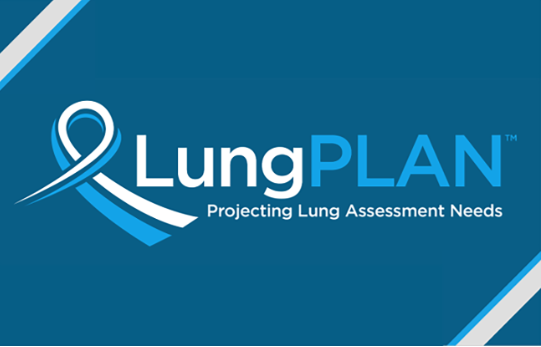LungPLAN Overview
A New Way To Plan Your Lung Cancer Program
Healthcare professionals, financial experts, and administrators can generate predictive reports customized for their lung cancer screening and nodule management programs after downloading the interactive model and entering data. Key initial questions gather data about your facility type, patient volume and growth rates, cancer incidence rates, the impact of patient navigators, and infrastructure costs.
View the benefits of using LungPLAN, download the model for yourself, and look at some of our resources to model your new screening program.

LungPLAN Benefits
Here are some key features that make LungPLAN robust and helpful.

LungPLAN Model
This new generation modeling tool will help you to build a new lung cancer screening and nodule management program or to expand your existing program.

LungPLAN Support Resources
LungPLAN User Manual and video training series
Lung cancer is the third leading cause of death among all ages in Mississippi. A large reason for that alarming statistics is the difficulty with early detection. The encouraging data surrounding lung cancer screening has helped drive the effort toward the initiation of lung cancer early detection programs across the state. As the University of Mississippi Medical Center (UMMC) serves patients from across the state, the Lung Cancer Early Detection Program was created to help identify lung cancer early and improve outcomes among our state’s population. However, this is not a UMMC-specific issue or fix. In order to accomplish the goal of flipping the script though early detection, our entire state must join together to accomplish a common goal. The creation of LungPLAN can help push other facilities toward investing in flipping the script. Its ability to show both short-and long-term financial forecasts can be vital in convincing leadership to make the jump to creating an early detection program. The task is daunting, but if we are to make the difference we strive to make, then early detection is key. LungPLAN is one resource that can make that jump easier.
Jonathan Hontaz, NP-C
Co-Director
Lung Cancer Early Detection Program UMMC Cancer Center and Research Institute
We need coordinated multilevel interventions to reduce rural-urban disparities in access to cancer care. As the largest healthcare provider in northwest Arizona, Kingman Regional Medical Center (KRMC) meets community needs through proactive initiatives to enhance healthcare. Using the LungPlan toolkit has allowed KRMC to direct limited resources and expertise to where they are needed the most – early detection and follow-up. People who seek cancer care hit barriers at every turn. Financial forecasting from LungPLAN supplied evidence for a permanent Nurse Navigator program and investment into KRMC’s WL Nugent Cancer Center infrastructure. Our patients will benefit from a shorter time to diagnosis and start their cancer treatment, while KRMC should see cost reductions through reduced rates of ER visits and readmissions, better adherence to treatment and follow-up plans, and reduced patient outmigrations. Together, let’s work towards a future where people have better access to health and cancer services, no matter where they live.
Megan Flummer, RN, BSN
Director of Cancer Center
Kingman Regional Medical Center
Baptist Memorial Health Care System (Memphis, TN) was honored to participate in this LungPLAN toolkit development. Our health system serves 111 counties across 5 states (TN, MS, AR, even small portions of MO and AL), and our population is heavily impacted by lung cancer. Years ago, our organization began the drive under Dr. Raymond Osarogiagbon’s leadership to systematically implement early detection programs for lung cancer. In order to justify the business case for this work, a team of Baptist leaders, including myself, spent months developing a program to justify this initiative. With the LungPLAN toolkit, the business model is pre-developed for healthcare leaders. The group working on this model used the best data and assumptions possible to take the guesswork out of business planning for early detection programs. When comparing the final LungPLAN model to the tool that Baptist built years before, it was amazing how similar the results were. The best part of the similarity between the tools it that Baptist has proven over the last few years that the model is very accurate. I hope that this tool helps healthcare organizations implement more early detection programs and SAVE LIVES!
Parker Harris, MHA
CEO and Administrator
Baptist Memorial Hospital – Tipton
Acknowledgements
The American Cancer Society National Lung Cancer Roundtable (NLCRT) was established in 2017 and is a consortium of more than 210 member organizations and 225 leading experts working together to create lung cancer survivors and improve the quality of life for those at risk for lung cancer and lung cancer patients and their families. We engage volunteer experts, including patient and caregiver advocate representatives, in multidisciplinary collaborations that drive the national conversation, catalyze action to create, build, and strengthen innovative solutions, and develop and disseminate evidence-based interventions and best practices. Our collective power and expertise propel us to take on challenges that reduce the impact of lung cancer through risk reduction, tobacco prevention, and control, early detection, improved lung cancer imaging, assurance of optimal diagnosis to position patients for appropriate therapy and care, eliminating lung cancer-related stigma, and strengthening state-based initiatives. By working together and avoiding duplication, we will drive progress faster than working alone to overcome lung cancer challenges, accelerate change, and address the determinants of cancer-related health disparities to advance health equity across the lung cancer continuum. This is the unique role of the NLCRT. The NLCRT is thankful for the financial support from its partners and the American Cancer Society that propel this work forward. We especially wish to thank the NLCRT Lung Cancer Early Detection Implementation Strategies Task Group, The FiscalHealth Group, and Ohlander Consulting Services, Inc. for their expertise and the many hours of review and deliberation that went into developing LungPLAN™. For a full list of acknowledgments, click here.